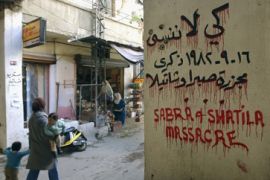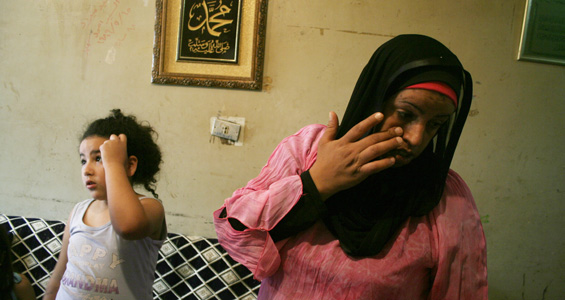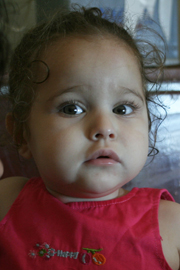Lebanon’s refugee waiting room
Almost 1,000 Palestinians live in a disused hospital 23 years after fleeing fighting.

 |
| Some 23 years after fleeing war, the al-Rukun family still live in a disused hospital [WANDER] |
“We thought we would be here for a few months,” says Huda al-Rukun, her red-rimmed eyes flicking around the tiny space she shares with her husband and five children. “No-one believed we would stay this long.”
Twenty-three years after they were forced out of the nearby Shatila refugee camp during a particularly bloody phase of the Lebanese civil war known as the War of the Camps, the Palestinian al-Rukun family are one of hundreds still living in a disused hospital in south Beirut.
The conflict may have finished 19 years ago, but many of those who fled the fighting have not been allowed back. Rebuilding was only permitted on the original site of camp, so those who had lived in the unofficial settlements attached to Shatila found themselves homeless.
Instead of returning to the camp, those families have spent the past quarter of a century squatting in the hospital complex, known locally as the Gaza buildings. This “temporary” shelter has become a permanent slum, housing almost a thousand people.
It is just a short taxi ride from downtown Beirut, but the buildings’ crumbling rooms make the city’s bright lights and trendy beach clubs seem a distant memory. Some of its residents live without running water, others without regular electricity. All are desperately poor.
Particularly vulnerable
| Refugee special |
|
|
The community is known as a “gathering,” the name given to any informal Palestinian settlement outside Lebanon’s 12 official camps.
Officials say that almost half of the 400,000 Palestinians in Lebanon now live in gatherings, where they are particularly vulnerable to poverty and ill-health.
“Palestinians in Lebanon live with a very high unemployment rate, and have limited access to public services and to the job market. This makes them poorer than Palestinians living in other countries,” says Hoda el Turk, a spokeswoman for the UN Relief and Works Agency (UNRWA) in Lebanon, which is tasked with providing services for Palestinian refugees.
She says those living outside the camps are not eligible for some of the essential services provided by the agency. “They cannot have their shelter rehabilitated by UNRWA because they are outside the camps, where UNRWA has no mandate to work,” she explains.
As a result, living conditions in Palestinian gatherings are often dire. The EU recently paid for improvements to the Gaza buildings, but walking through the main entrance to the al-Rukuns’ building, you would not know it.
Electricity cables loop from the ceiling in the corridors, dropping dangerously close to the puddles of stagnant water that gather on the bare concrete floors. Rubbish piles up in the disused lift shafts, infusing the place with a permanent stench of decay, and a trickle of foul-smelling liquid drips down the staircase from an unseen source.
Inside the family’s two spartan rooms on the fourth floor, there have been efforts to brighten things up. A threadbare rug lies on the floor, and a carefully placed picture frame covers the worst of a crack in the wall. But it is hard to escape the squalor of the buildings; refuse is piled up on the flat roof outside the window, rotting in the late summer heat.
“The only good thing about this place is that we don’t pay rent,” Huda says, watching her youngest children playing together on the floor.
‘No life’
 |
| Residents of the buildings fear for their children’s’ health |
The mother of five fears for their future. “There is no life here for my children,” she says. “They have no privacy. There is no dignity. They get sick all the time.”
But they have nowhere else to go. The camps are full and poverty is rife. UNRWA is facing serious funding problems, and the possibility of cutting services and scaling back operations is never far away.
Meanwhile, figures released in June show there is a greater proportion of designated “hardship cases”- a status given to particularly poor or vulnerable refugees – in the Palestinian population of Lebanon than anywhere else in the region, including the Gaza Strip.
It is a sign of the desperate conditions that many Palestinian refugees in Lebanon have found themselves in.
For those living in the gatherings, accessing UNRWA services can be difficult. Most of UNWRA’s facilities – schools, clinics and welfare offices – are inside the camps, and while in theory they are open to all registered Palestinians, regardless of where they live, in practise getting from the more remote gatherings to the camps can be difficult.
Even in the Gaza buildings, which lie close to the facilities of the Shatila camp, almost a quarter of the children do not go to school and the residents rely on local NGOs rather than UNRWA for essential services.
‘Not sustainable’
Rita Hamdan, the director of Popular Aid for Relief and Development, a local NGO, has been involved in helping residents of the buildings since they arrived in 1986.
“These people have been deprived of many direct services,” she says. “We are raising awareness on health issues, and provide sanitation services. We also run a clinic, and a community development centre where we do youth activities.”
She believes that money would be better spent on moving the residents of the hospital than on endless maintenance projects.
“The best solution is not to improve the Gaza buildings,” she says. “There is no sustainability there. It was not built to accommodate all these people. They shouldn’t be made to stay there for ever.”
But back in the gloom of the disused hospital, Huda says she does not expect to leave the damp rooms that have become her home any time soon.
“I have no hope for the future,” she says, looking to the door and sighing. “Maybe what I haven’t had in this life, I will be given in the next.”
Andrew Wander, a media fellow with legal charity Reprieve, works on Al Jazeera’s Public Liberties and Human Rights Desk.
 UN: ‘wars displace record numbers’
UN: ‘wars displace record numbers’